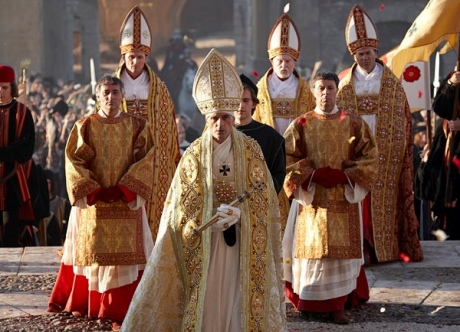Read the full original article at: http://www.nytimes.com/2011/03/27/arts/television/the-borgias-a-showtime-mini-series-starring-jeremy-irons.html

March 25, 2011
Plum Role: History’s Ultimate Godfather
By CHARLES McGRATH
ALTHOUGH they lived in the 15th and 16th centuries, the Borgias, the subject of a new nine-part Showtime mini-series that begins next Sunday, were a family made for TV. The Borgias were rich, ruthless, scheming and corrupt, and so sexually voracious that, if you believe the rumors, they slept with everyone, including one another. Mario Puzo, who worked on a novel about them, called the Borgias the Corleones of the Renaissance. They also resemble “The Sopranos” a little. Imagine if Tony, instead of running a garbage hauling business, had bought himself the papacy.
“The Borgias,” which cost $45 million to make, was created, written and produced by the film director Neil Jordan, who also directed several episodes. It is Showtime’s latest entry in what is becoming a high-stakes game on cable TV now that it’s no longer enough merely to show Hollywood movies or the odd sporting event. If you want to sell cable subscriptions these days, you need not just original programming but a long-running, franchise-defining series like “The Tudors,” Showtime’s recent hit.
A bankable star doesn’t hurt either, and in the new series the Borgia paterfamilias, Rodrigo, who became Pope Alexander VI, is played by Jeremy Irons, not exactly typecast. To judge from his famous portrait by Cristofano dell’Altissimo, the historical Rodrigo, corpulent and hatchet nosed, looked as if he had been inflated with a tire pump. At the time of his death, or so the legend goes, he was so bloated and debauched that when his body was inserted into the coffin, someone had to jump on the lid to get it shut.
“When we first talked about the part, Jeremy was worried that he didn’t have that bulbous weight,” Mr. Jordan said recently, speaking by phone from his house in Ireland. “I told him that if we can get this guy properly situated, torn between God and politics, the weight wouldn’t matter.” He added: “I wanted someone who would understand the kind of history here. ‘The Borgias’ isn’t just a saga of poisoning and nubile women, like a Ken Russell movie. Well, we do have all that, but we also put this figure in historical context.”
Mr. Irons, still elegantly handsome at 62, doesn’t look much like Pope Alexander. He nevertheless has, both on screen and in person, a slightly detached, regal quality, a darting, glinting intelligence, and occasionally an air of weary melancholy, all very useful papal attributes. He also has a long history of playing characters who are morally ambiguous if not outright villainous: Humbert Humbert in “Lolita”; the deranged twin gynecologists in David Cronenberg’s “Dead Ringers”; the accused wife poisoner Claus von Bülow in “Reversal of Fortune” (for which he won an Academy Award); even Scar in “The Lion King.” And with that deep, rumbling voice, like an organ echoing in a cathedral, he sounds the way a Renaissance pope should sound: the sibilant S’s, the luxurious drawn-out vowels suggesting knowledge acquired outside the seminary.
Mr. Irons speaks this way in real life too, and in New York recently, draped over a chair in his suite at the Lowell hotel, he employed that same voice to say, “We don’t talk about my voice.” He doesn’t like to be made conscious of it, he explained, recalling a conversation he had years ago with the actor John Hurt. “You know all these young actors coming up, 18, 19, 20 — rather good, aren’t they?” Mr. Hurt said. “You know what I do? I go up and say, ‘You’re a great actor, with such a fantastic voice. Have you ever listened to it?’ ”
And then they’re finished, Mr. Hurt said gleefully.
Mr. Irons was a late bloomer. He grew up well to do, on the Isle of Wight in England and went to Sherborne, a midlevel boys’ boarding school, where he was a good athlete but such an indifferent student that the headmaster predicted he would wind up as a paratrooper. He tried being a social worker before becoming an actor and then had such trouble finding parts that for a while he supported himself as a home remodeler. His breakthrough didn’t come along until 1981, when he was cast as the earnest, proper Charles Ryder in the 11-part television adaptation of Evelyn Waugh’s “Brideshead Revisited.”
“We had just come through the ‘Look Back in Anger’ phase, and actors like Tom Courtenay and Albert Finney were sort of fashionable — what I call the kitchen-sink actors, actors with local accents,” he said. “It was ‘Brideshead’ that made it acceptable to have someone who was tall and English and spoke properly as a hero.”
Nevertheless he mostly sees his archetypal Englishness as a liability rather than a strength. “The American version of the Englishman is rather like the English version of the American — sort of one-dimensional and not very attractive,” he said. “I’ve tried not to capitalize on my Englishness. If I had the charm of David Niven or Hugh Grant, then maybe I would, but I don’t. I’m dirtier and more odd.”
The roles of characters who are strange or morally enigmatic have come to him, he went on, partly by accident, or because he has a reputation for playing them, and partly because he has sought them out. “Certainly they attract me,” he said. “I’m always interested in good and evil, who’s a good person, who’s a bad person, believing, really, that we’re all rather gray.”
No one is grayer than Rodrigo Borgia, who bought the papacy in a rigged election, had numerous mistresses and fathered four children yet was also a skilled diplomat and renowned patron of the arts. Mr. Jordan said he thought the whole family has suffered from bad press: “A lot of the history was written by Rodrigo’s successors, especially by Cardinal Giuliano della Rovere, who became Pope Julius II. There was no Gibbon or Niall Ferguson to write about the Borgias, and so they become a little demonized.”
He added that what he found interesting in writing the script was that once Rodrigo was put in the context of his family, he remained attractive no matter how evil he became. Oddly, the villain of “The Borgias” is Rodrigo’s rival, della Rovere (played by Colm Feore), a model of probity and holiness.
Mr. Irons said that in researching the part he made a list of all the qualities attributed to Rodrigo Borgia. “It was like a rainbow,” he said. “The list goes all the way from ‘generous man,’ ‘wonderful company,’ ‘a great organizer’ to ‘poisoner,’ ‘cruel’ and ‘despotic,’ all the worst adjectives you can think of. I thought: ‘That’s very interesting. Maybe it’s all true. Maybe from different vantage points all those adjectives could be seen to be the truth.’ Film is always a kind of patchwork anyway, and my hope is that Rodrigo will emerge as a man of many different colors and many different behaviors. He’s completely different when he’s being persuaded by his daughter or bullied by the mother of his children or negotiating with the Spanish ambassador. I never judge. That’s not my job. I just try to link all those attributes.”
Mr. Jordan said: “Jeremy does manage to humanize the monster, doesn’t he? I loved him as Claus von Bülow. You had absolutely no idea what that character was thinking.”
About playing the pope, a character who is always being deferred to while being lugged around on a throne or gliding through his palace in robes, Mr. Irons said, “It’s daft, really, but someone’s got to do it.” Then he became serious and went on, “I hope the Vatican doesn’t go down the obvious path of creating a great controversy over this, though I’m sure Showtime would love that.”
He added: “I think the great strength of Neil’s script is that because he’s a very bright man and a historian who reads very widely, he’s found something possibly nearer the truth about the Borgias, though God knows what the truth really is. I’m hoping that the audience will be totally confused about whether to root for this man. It’s a bit like von Bülow, you know. Did he do it or not?”
March 25, 2011
Categories: Latest News and Posts . Tags: Colm Feore, Derek Jacobi, Jeremy Irons, Neil Jordan, NY Times, Pope Alexander, Rodrigo Borgia, Showtime, The Borgias . Author: jeremyironsno1fan . Comments: Leave a comment








You must be logged in to post a comment.